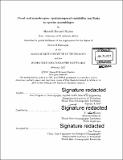Coral reef soundscapes: spatiotemporal variability and links to species assemblages
Author(s)
Kaplan, Maxwell Bernard
DownloadFull printable version (16.96Mb)
Other Contributors
Woods Hole Oceanographic Institution.
Advisor
T. Aran Mooney.
Terms of use
Metadata
Show full item recordAbstract
Coral reefs are biodiverse ecosystems that are at risk of degradation as a result of environmental changes. Reefs are constantly in a state of flux: the resident species assemblages vary considerably in space and time. However, the drivers of this variability are poorly understood. Tracking these changes and studying how coral reefs respond to natural and anthropogenic disturbance can be challenging and costly, particularly for reefs that are located in remote areas. Because many reef animals produce and use sound, recording the ambient soundscape of a reef might be one way to efficiently study these habitats from afar. In this thesis, I develop and apply a suite of acoustics-based tools to characterize the biological and anthropogenic acoustic activity that largely comprises marine soundscapes. First, I investigate links between reef fauna and reef-specific acoustic signatures on coral reefs located in the U.S. Virgin Islands. Second, I compare those findings to a more expansive study that I conducted in Maui, Hawaii, in which the drivers of bioacoustic differences among reefs are explored. Third, I investigate the distances over which sounds of biological origin may travel away from the reef and consider the range within which these acoustic cues might be usable by pelagic larvae in search of a suitable adult habitat. Fourth, I assess the extent to which the presence of vessel noise in shallow-water habitats changes the ambient soundscape. Finally, I present the results of a modeling exercise that questions how ocean noise levels might change over the next two decades as a result of major projected increases in the number and size of and distance traveled by commercial ships. The acoustics-based tools presented here help provide insight into ecosystem function and the extent of human activity in a given habitat. Additionally, these tools can be used to inform an effective regulatory regime to improve coral reef ecosystem management.
Description
Thesis: Ph. D., Joint Program in Oceanography/Applied Ocean Science and Engineering (Massachusetts Institute of Technology, Department of Biology; and the Woods Hole Oceanographic Institution), 2017. Cataloged from PDF version of thesis. Includes bibliographical references (pages 131-143).
Date issued
2017Department
Joint Program in Oceanography/Applied Ocean Science and Engineering; Woods Hole Oceanographic Institution; Massachusetts Institute of Technology. Department of BiologyPublisher
Massachusetts Institute of Technology
Keywords
Joint Program in Oceanography/Applied Ocean Science and Engineering., Biology., Woods Hole Oceanographic Institution.